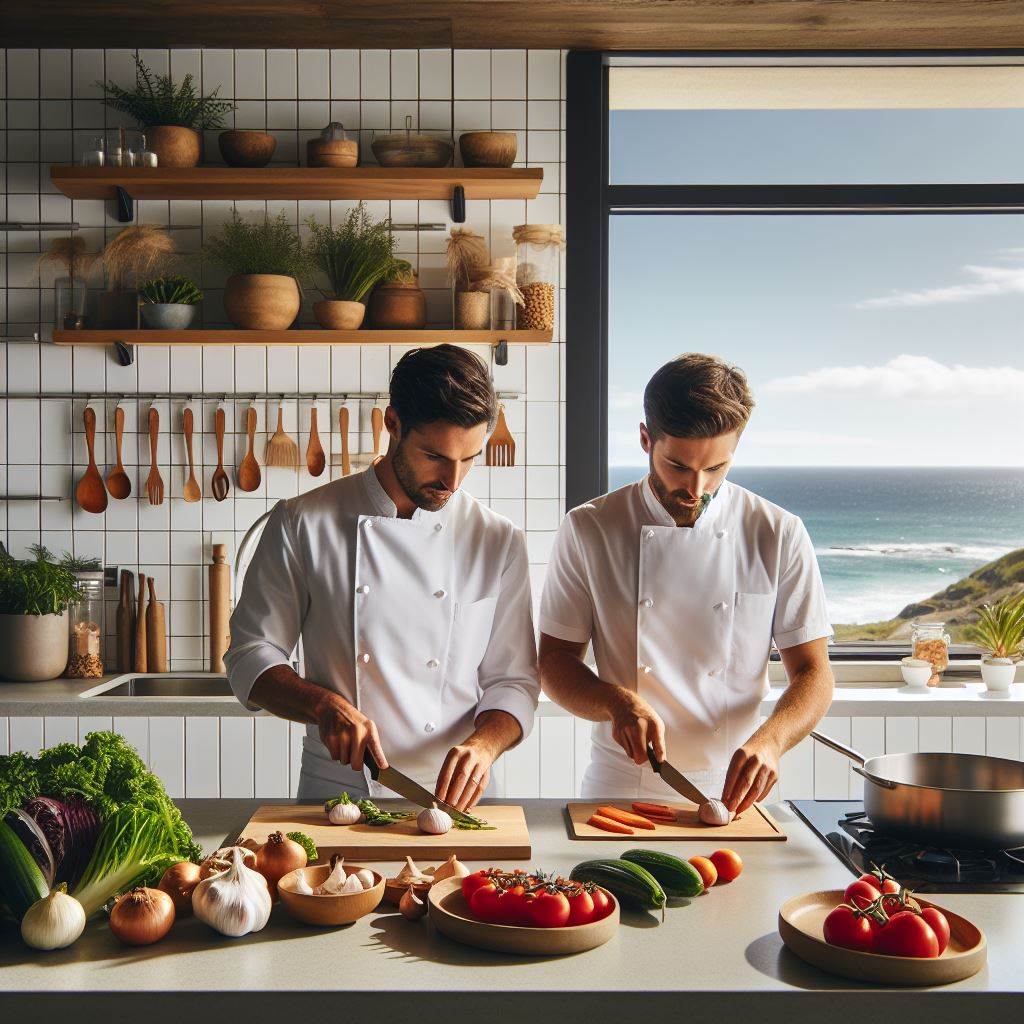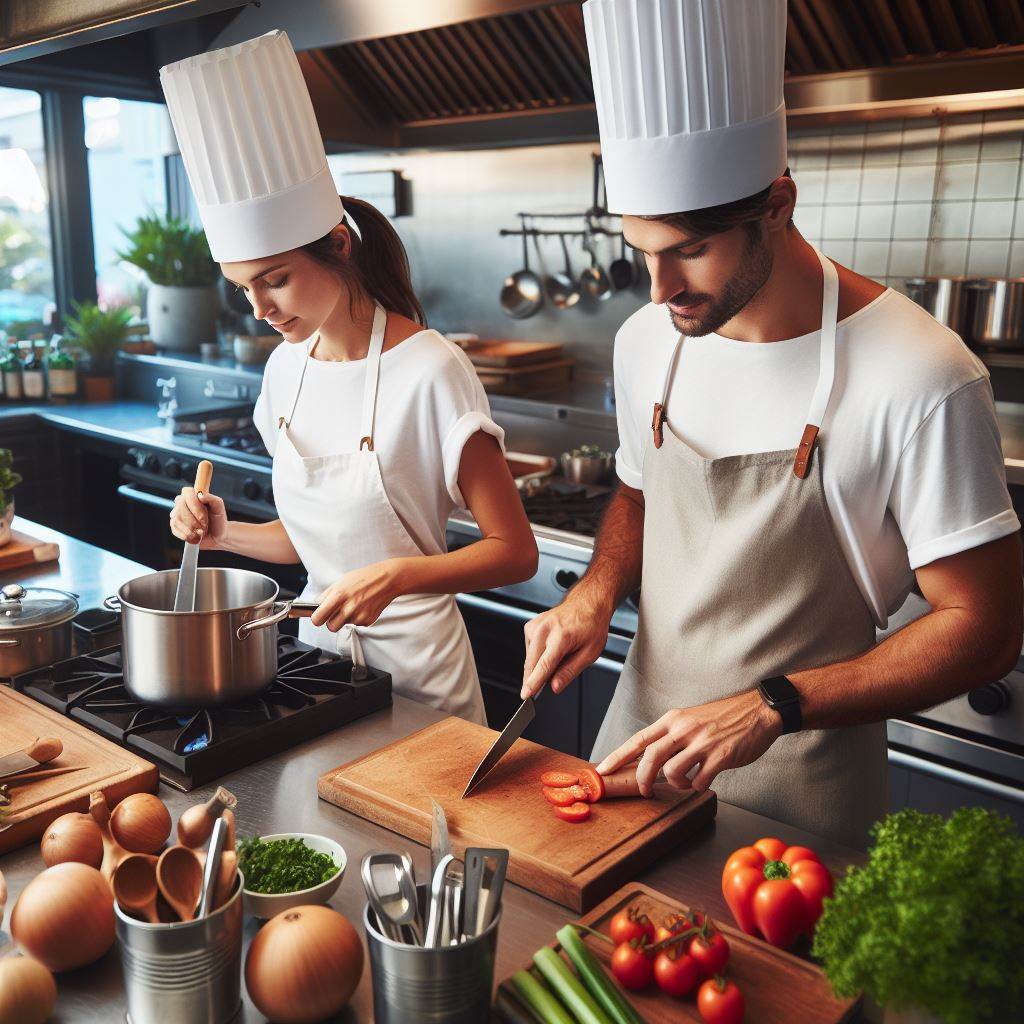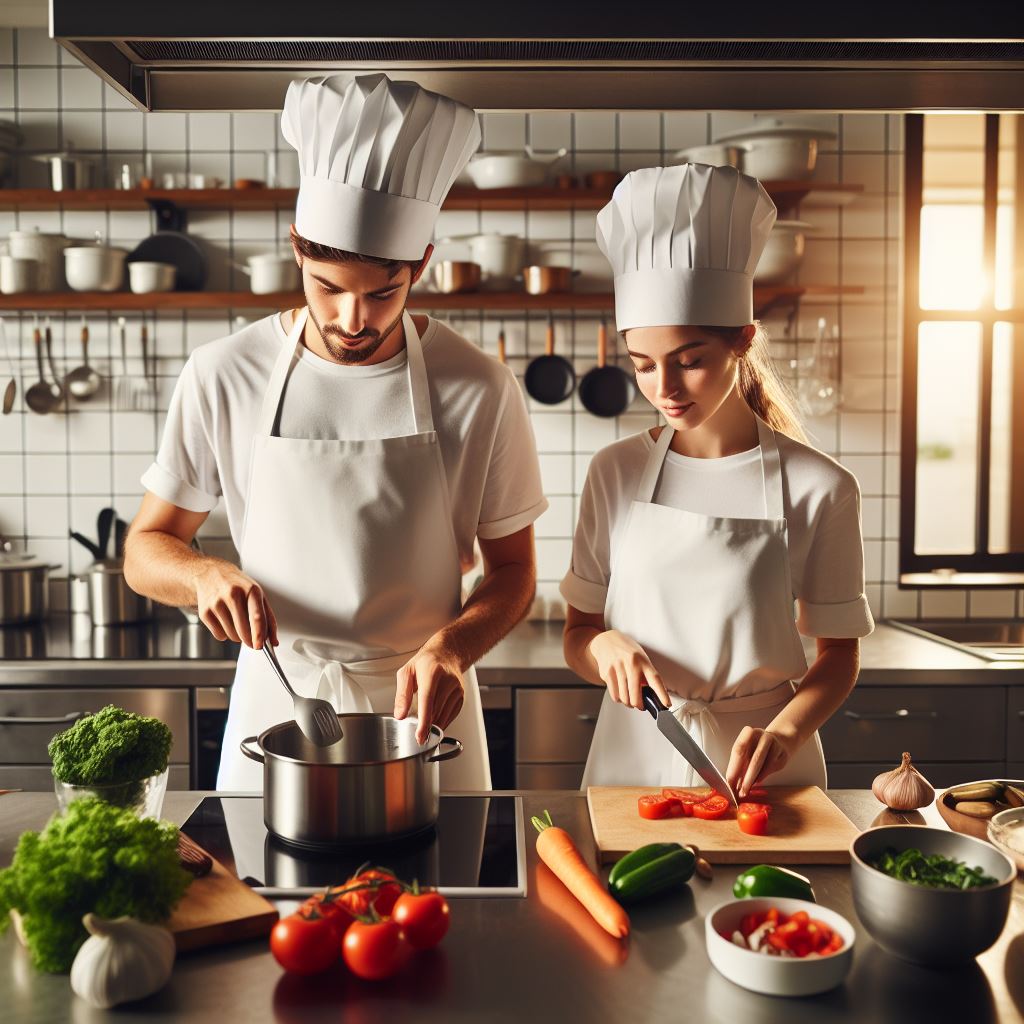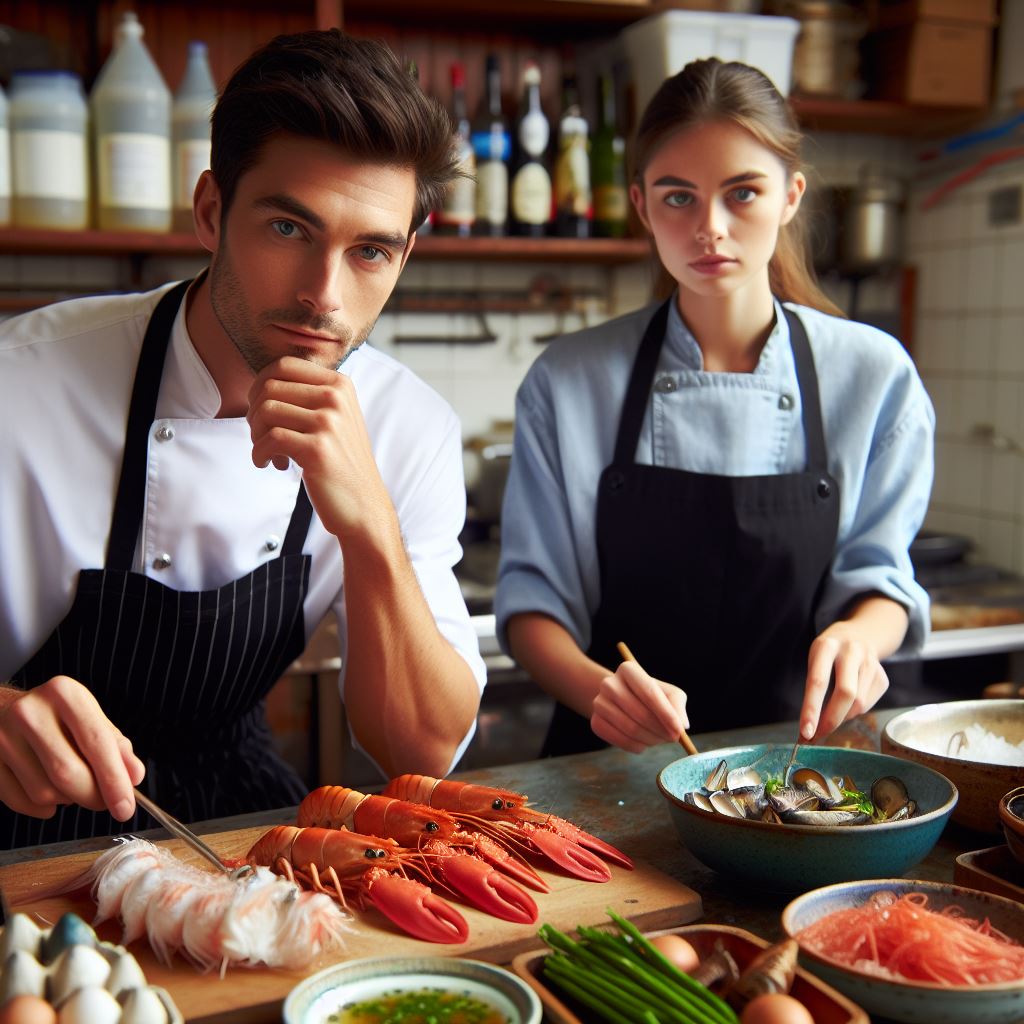Introduction
Australian resorts redefine the role of cooks beyond traditional culinary boundaries.
Cooks curate extraordinary dining experiences in idyllic settings.
They ensure culinary perfection amidst picturesque landscapes, orchestrating guest satisfaction.
In this section, we delve into cooks’ multifaceted role within luxurious havens.
From crafting dishes to managing operations, cooks are pivotal.
Resort cuisine ranges from casual to fine dining experiences.
Cooks are creators infusing meals with innovation and local flavor.
Guests expect culinary journeys reflecting surroundings, guided by cooks.
Their role extends beyond kitchens, collaborating with local suppliers for quality ingredients.
They navigate diverse dietary preferences, balancing creativity with efficiency.
From buffets to dinners, cooks architect memorable gastronomic experiences.
Their dedication, precision, and creativity define their role.
Cooks contribute to overall ambiance, collaborating for guest satisfaction.
Their dynamic role demands adaptability and passion for excellence.
Join us through lush resort landscapes, where cooks create memorable meals.
Your Personalized Career Strategy
Unlock your potential with tailored career consulting. Get clear, actionable steps designed for your success. Start now!
Get StartedTheir indispensable contribution to resort life enhances guest experiences.
Prepare to immerse in culinary excellence, unveiling cooks’ exceptional role in Australian resorts.
The Role of Cooks in Australian Resorts
Responsibilities and Duties of Cooks in Resorts
- Preparing and cooking a wide variety of cuisines to meet guest preferences.
- Maintaining a clean and organized kitchen environment to ensure food safety.
- Collaborating with the kitchen team to ensure efficient food preparation and timely service.
- Adhering to health and safety regulations to guarantee the well-being of guests and staff.
- Monitoring and controlling food inventory to minimize wastage and maximize profitability.
- Assisting in the recruitment and training of new kitchen staff to maintain a skilled workforce.
- Ensuring proper storage and labeling of ingredients to prevent cross-contamination.
- Adapting recipes and menus to accommodate special dietary requirements or restrictions.
- Managing food costs by implementing portion control and minimizing ingredient waste.
- Catering for large events and functions, providing guests with memorable dining experiences.
Cooks’ Involvement in Menu Planning and Culinary Experiences
Cooks hold a significant role in menu planning and creating culinary experiences for guests in Australian resorts.
They collaborate closely with chefs and food and beverage managers to develop innovative menus that showcase the regional flavors and cater to the diverse preferences of guests. Cooks contribute their expertise by:
- Suggesting seasonal and local ingredients to incorporate into menu offerings.
- Experimenting with different cooking techniques and flavor combinations to enhance dishes.
- Providing input on portion sizes, plating techniques, and overall presentation of dishes.
- Advising on the popularity and demand of certain menu items based on guest feedback.
- Creating special menus for themed nights or culinary events to elevate guest experiences.
Importance of Cooks in Maintaining High-Quality Food Standards
Cooks play a vital role in maintaining high-quality food standards in Australian resorts. Their commitment to excellence ensures that guests enjoy exceptional dining experiences throughout their stay. The significance of cooks in this regard is evident through
- Executing precise cooking techniques to preserve the flavors, textures, and nutritional value of ingredients.
- Strict adherence to standardized recipes and portion control to maintain consistency in taste and presentation.
- Continuously monitoring and adjusting cooking processes to meet changing guest expectations.
- Collaborating with suppliers to source the freshest and finest quality ingredients.
- Regularly updating skills and knowledge through training and staying informed about culinary trends.
- Receiving and addressing guest feedback to improve food quality and service standards.
- Performing regular quality inspections and promoting a culture of excellence in the kitchen.
- Contributing to the overall reputation and success of the resort by delivering outstanding dining experiences.
In general, cooks in Australian resorts play a vital role in delivering exceptional culinary experiences to guests. Their responsibilities range from food preparation and inventory management to menu planning and innovating flavors.
By maintaining high food standards, they enhance the overall reputation and success of resorts.
Read: Navigating COVID-19: Travel Agents’ Advice
Qualifications and Skills Required
When it comes to working as a cook in Australian resorts, there are certain qualifications and skills that are necessary for success. A combination of formal culinary education and hands-on experience is highly valued in this industry.
Formal Culinary Education
- A formal culinary education is often required or preferred by employers in Australian resorts.
- Completing a culinary program or obtaining a degree in culinary arts provides a strong foundation.
- These programs teach aspiring cooks about cooking techniques, food safety regulations, and menu planning.
Experience
- Hands-on experience in the culinary field is highly beneficial for cooks working in Australian resorts.
- Having experience in high-volume kitchens or resort settings helps individuals adapt quickly to the fast-paced environment.
- Previous experience also demonstrates a cook’s ability to work under pressure and meet strict deadlines.
Menu Development
- One of the key skills required for cooks in resorts is menu development.
- They should possess the ability to create and execute creative and appealing menus that cater to diverse tastes.
- Understanding food trends and incorporating local produce into dishes is also important.
Food Safety Knowledge
- Cooks in Australian resorts must have a comprehensive understanding of food safety protocols.
- They need to follow strict hygiene standards and ensure that the food they prepare is safe for consumption.
- Knowing how to handle and store food properly is crucial to prevent foodborne illnesses.
Excellent Culinary Techniques
- Having excellent culinary techniques is a fundamental requirement for cooks.
- They should be skilled in various cooking methods, such as sautéing, grilling, baking, and frying.
- Presentation skills are also important to create visually appealing dishes.
Adaptability and Teamwork
- Cooks working in Australian resorts need to be adaptable and capable of working in a team.
- Resort kitchens can be fast-paced, and the ability to multitask and collaborate with other kitchen staff is essential.
- Being open to feedback and having good communication skills contribute to a harmonious work environment.
Passion for the Culinary Arts
- A genuine passion for cooking and the culinary arts is vital for success in this role.
- Cooks in resorts need to have a love for food and a desire to constantly improve their skills.
- Staying updated with new cooking techniques and trends helps in providing guests with an exceptional dining experience.
Generally, working as a cook in Australian resorts requires a combination of formal culinary education, hands-on experience, and specific skills.
Menu development, food safety knowledge, excellent culinary techniques, adaptability, teamwork, and a passion for the culinary arts are some of the key qualifications and skills required for cooks in this industry.
Read: Travel Insurance Tips from Expert Agents

Learn More: Exploring Australia: A Guide’s Perspective
Discover More: Hotel Management: Skills You Need in 2024
Work Environment and Challenges
Typical work environment for cooks in Australian resorts
A typical work environment for cooks in Australian resorts is fast-paced and demanding. They often work in high-pressure kitchens where they have to handle multiple orders at once.
The job requires cooks to adapt to different dietary requirements and guest preferences. They need to be versatile and able to cater to a variety of tastes and restrictions.
Cooks in resorts may have to prepare meals for large numbers of guests, especially during peak tourist seasons. This can put additional pressure on them to work efficiently and quickly.
Stand Out with a Resume That Gets Results
Your career is worth more than a generic template. Let us craft a resume and cover letter that showcase your unique strengths and help you secure that dream job.
Get HiredThe work environment can be physically challenging as well. Cooks often have to stand for long hours, lift heavy pots and pans, and work in hot and steamy conditions.
Fast-paced and demanding nature of the job
In addition to the physical demands, the job of a cook in a resort requires excellent time management skills. They need to be able to prioritize tasks and ensure that all orders are prepared and served in a timely manner.
Communication and teamwork are essential in this role. Cooks need to coordinate with other kitchen staff, such as sous chefs and servers, to ensure a smooth flow of operations.
Need for cooks to adapt to different dietary requirements and guest preferences
Cooks also need to be able to handle high-stress situations. They should remain calm and focused even when facing tight deadlines or difficult guests.
One of the biggest challenges for cooks in resorts is adapting to different dietary requirements. Guests may have allergies, intolerances, or specific dietary choices, such as vegetarian or gluten-free. Cooks need to be knowledgeable and creative in preparing meals that meet these requirements without compromising taste or quality.
Maintaining high standards of hygiene and food safety is crucial in resorts. Cooks have to follow strict sanitation protocols and ensure that all food is prepared and stored properly to prevent any foodborne illnesses.
Continuous learning is another important aspect of being a cook in a resort. With evolving food trends and new cooking techniques, cooks need to stay updated and constantly improve their skills.
In review, working as a cook in Australian resorts is a challenging yet rewarding job. The fast-paced and demanding nature of the job requires cooks to be adaptable, efficient, and skilled in handling various dietary requirements and guest preferences.
While it can be physically and mentally demanding, cooks in resorts play a vital role in providing guests with memorable dining experiences.
Read: Top 10 Destinations Aussie Agents Love
Career Growth and Opportunities
In the dynamic world of Australian resorts, the role of cooks offers immense potential for career growth. With a growing tourism industry, there is a constant demand for skilled cooks, providing numerous opportunities for individuals in this field.
Potential Career Growth
- Starting as an entry-level cook, one can gradually progress to become a chef de partie.
- With experience and skill development, cooks can aim for the position of a sous chef.
- For ambitious individuals, the ultimate goal can be achieving the esteemed position of an executive chef.
- By continuously learning and excelling in their craft, cooks can rise through the ranks quickly.
The career growth for cooks in Australian resorts is not limited to just climbing the hierarchical ladder. The diverse nature of resorts also offers opportunities to gain experience in various cuisines and cooking techniques.
Experience in Various Cuisines and Cooking Techniques
- Australian resorts attract tourists from around the world, leading to a rich multicultural culinary environment.
- Cooks have the chance to work on different menus, allowing them to experiment with various cuisines.
- They can learn about regional ingredients, traditional cooking techniques, and global flavors.
- This exposure helps cooks enhance their culinary skills, making them versatile and adaptable professionals.
As cooks gain experience and expertise, they can move up the ranks and take on higher positions within the kitchen hierarchy.
Moving up to Higher Positions
- With sufficient experience and proven skills, cooks can aspire to become sous chefs.
- Sous chefs work closely with executive chefs, assisting in menu planning, staff supervision, and kitchen operations.
- This position offers the opportunity to showcase leadership skills and take on more responsibilities.
- For those with exceptional talent, dedication, and experience, the position of an executive chef becomes an achievable goal.
Executive chefs are responsible for the overall culinary direction of the resort, managing multiple kitchens and ensuring high-quality dining experiences for guests. They play a vital role in shaping the resort’s culinary reputation.
Moreover, the career growth and opportunities for cooks in Australian resorts are further strengthened by the industry’s emphasis on ongoing professional development and training.
From attending workshops and seminars to participating in culinary competitions, cooks can continuously enhance their skills and expand their knowledge.
Transform Your LinkedIn for Maximum Impact
Elevate your professional brand with a LinkedIn profile that attracts recruiters, showcases your expertise, and maximizes opportunities. Stand out in your industry with a profile built for success.
Boost ProfileEssence, the role of cooks in Australian resorts offers exciting prospects for career growth. Apart from climbing the hierarchical ladder, cooks have the chance to gain experience in diverse cuisines, cooking techniques, and eventually move up to higher positions such as sous chefs or even executive chefs.
With a thriving tourism industry, the future looks promising for aspiring cooks seeking a rewarding and fulfilling career in Australian resorts.
Read: Why Use a Travel Agent for Business Trips?
Conclusion
In closing, cooks in Australian resorts are the culinary architects of unforgettable guest experiences. Their role is indispensable.
From crafting exquisite dishes to ensuring seamless operations, cooks elevate the resort dining experience.
They embody creativity, precision, and dedication, infusing each meal with innovation and passion.
The culinary journey in Australian resorts reflects the beauty of the surroundings.
Cooks collaborate with local suppliers, ensuring the use of fresh, quality ingredients.
Their ability to cater to diverse dietary preferences sets the standard for guest satisfaction.
Beyond the kitchen, cooks contribute to the overall ambiance, enhancing the guest experience.
Their adaptability and passion for excellence define their role in Australian resort life.
Guests leave with memories of exceptional dining experiences, thanks to the skill and dedication of cooks.
In the lush landscapes of Australian resorts, cooks play an essential and dynamic role.
As we conclude, we recognize the invaluable contribution of cooks to the hospitality industry.
Prepare to savor the delights of resort dining, where every dish tells a story of culinary excellence.




